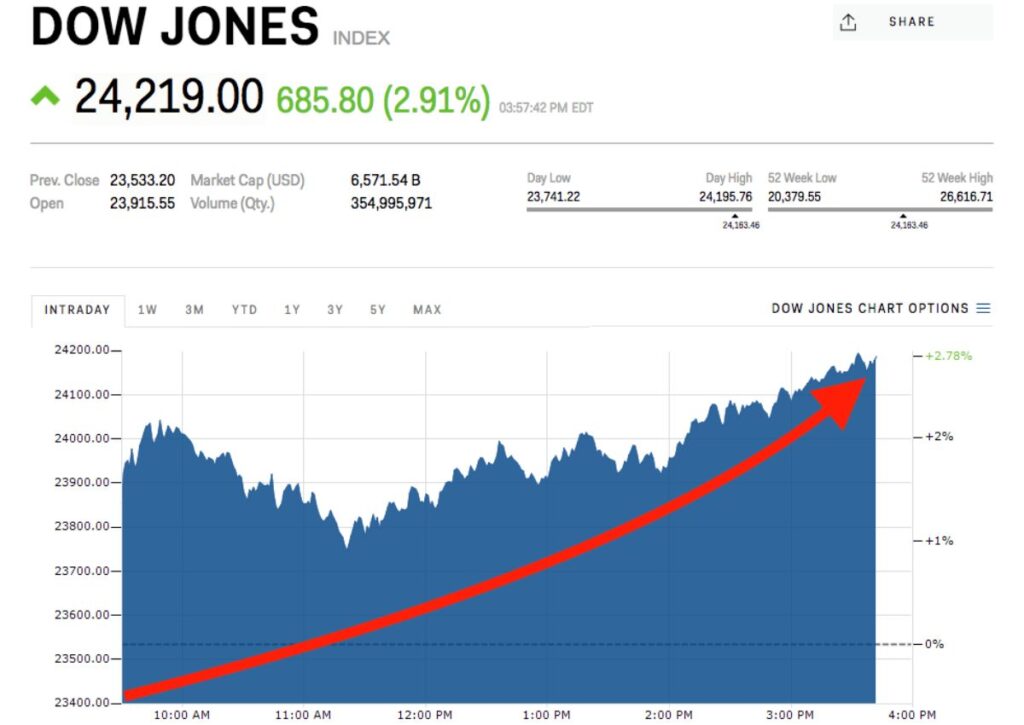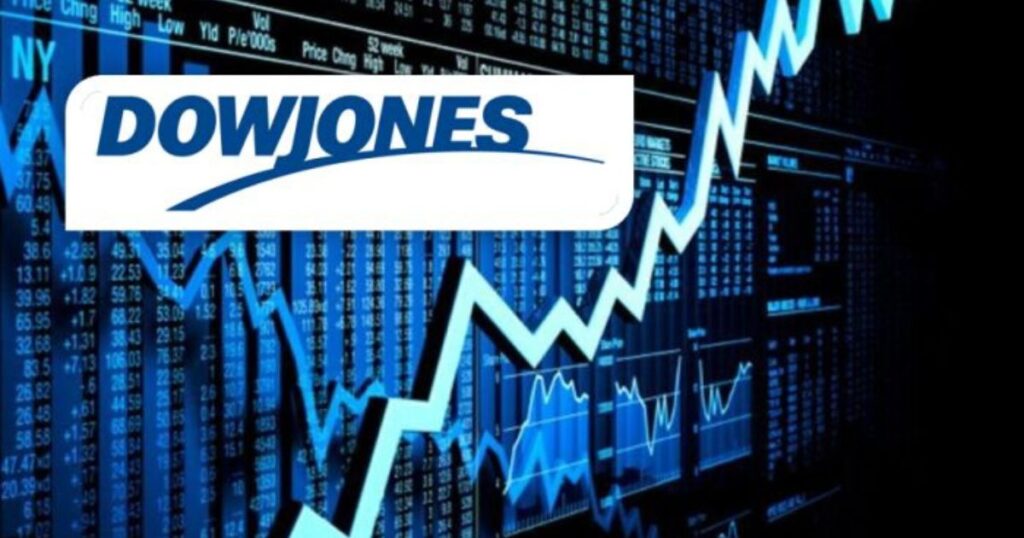In the ever-evolving landscape of financial technology, the Dow Jones FintechZoom has emerged as a game-changer for investors and market watchers alike. This powerful platform is reshaping how we analyze and interact with the Dow Jones Industrial Average (DJIA), one of the most venerable stock market indices in the world.
As we dive into the intricacies of this innovative tool, we’ll explore its purpose, impact, and potential to transform investment strategies in the United States and beyond.
What Is the Purpose of Dow Jones FintechZoom?
FintechZoom serves as a cutting-edge media platform that bridges the gap between traditional financial markets and the burgeoning world of financial technology. Its primary purpose is to provide real-time analytics and insights on the Dow Jones Industrial Average, NASDAQ, and other global indices. By leveraging advanced data analysis techniques, FintechZoom offers investors a comprehensive view of market trends, enabling them to make more informed decisions in an increasingly complex financial landscape.
The platform doesn’t just stop at stocks and indices; it extends its coverage to various financial instruments including commodities, loans, mortgages, crypto, and banking sectors. This holistic approach allows users to gain a broader understanding of the interconnected nature of global financial markets.
Dow Jones Industrial Average Stock Market Index (Live)
One of the most powerful features of FintechZoom is its ability to provide live tracking of the DJIA. This real-time data is crucial for investors who need to make split-second decisions based on market movements.
The platform’s interface is designed to be user-friendly, allowing both novice and experienced traders to access and interpret this valuable information efficiently.
What Is DJIA?
The Dow Jones Industrial Average is more than just a number flashing across stock tickers. It represents the broader market health and includes 30 prominent companies across various industries.
While Nasdaq focuses more on technology, the Dow Jones represents a broader spectrum of the U.S. economy, including sectors like finance, healthcare, and manufacturing. These blue-chip stocks are considered leaders in their respective industries and serve as a barometer for the overall U.S. stock market performance.
The Actual Reason for Creating DJIA
To truly appreciate the DJIA, we must look back to its origins in 1896. Created by Charles Dow and Edward Jones, founders of The Wall Street Journal, the index initially comprised just 12 companies, primarily from the industrial sector. Notable inclusions were General Electric, American Tobacco, and United States Rubber Company.
The DJIA’s creation was driven by the need for a simple, yet effective way to gauge the health of the U.S. stock market. Over time, it has evolved to include 30 companies, reflecting the changing landscape of the American economy. This evolution mirrors the shift from a predominantly industrial economy to one that encompasses technology, healthcare, finance, and consumer goods.
Milestones and Events
Throughout its history, the DJIA has witnessed and reflected numerous significant events:
- The Great Depression (1929-1939)
- World War II (1939-1945)
- The Tech Boom (1990s)
- The 2008 Financial Crisis
- The COVID-19 Pandemic (2020-present)
Each of these events left an indelible mark on the index, showcasing its resilience and ability to adapt to changing economic landscapes.
How is DJIA Calculated?

Understanding the DJIA’s calculation method is crucial for investors using FintechZoom. Unlike many other indices, the DJIA is a price-weighted index. This means that higher-priced stocks have a greater influence on the index’s value.
The basic formula for calculating the DJIA is:
DJIA = Sum of stock prices of all 30 companies / Dow Divisor
The Dow Divisor is a crucial component that ensures the index’s continuity despite stock splits, spinoffs, and other corporate actions. As of 2024, the Dow Divisor stands at approximately 0.151.
This price-weighted methodology sets the DJIA apart from market-cap-weighted indices like the S&P 500. While this approach has its critics, it has proven to be an enduring and widely-followed measure of market performance.
Impact of Price-Weighting on DJIA
The price-weighted nature of the DJIA has several implications for investors:
- Higher-Priced Stocks Dominate: Companies with higher stock prices have a disproportionate impact on the index. For example, a $100 stock move in a high-priced DJIA component like Goldman Sachs would have a much greater effect on the index than a similar move in a lower-priced stock like Intel.
- Stock Splits Matter: When a company splits its stock, it can significantly change its influence on the index. This is why the Dow Divisor is adjusted to maintain continuity.
- Limited Representation: Critics argue that price-weighting doesn’t accurately represent a company’s true market value or importance to the economy.
The Role of the Dow Divisor
The Dow Divisor is a critical element in the DJIA calculation. It’s adjusted to account for various corporate actions:
- Stock Splits: When a company splits its stock, the divisor is reduced to offset the price reduction.
- Spinoffs: If a DJIA company spins off part of its business, the divisor is adjusted to maintain index continuity.
- Replacements: When a company is removed from the index and replaced, the divisor is recalculated.
Comparing DJIA Calculation to Other Indices
To better understand the DJIA’s unique calculation method, let’s compare it to other major indices:
| Index | Calculation Method | Pros | Cons |
| DJIA | Price-weighted | Simple to understand, historically consistent | Overemphasizes high-priced stocks |
| S&P 500 | Market-cap weighted | Better represents economic importance of companies | Can be dominated by largest companies |
| Nasdaq-100 | Modified market-cap weighted | Balances representation of large and small companies | Complex calculation method |
Find This: White Oak Global Advisors Lawsuit Settlement
FintechZoom’s Role in DJIA Calculation Analysis
FintechZoom provides valuable tools for investors to understand and analyze the DJIA calculation:
- Real-time Divisor Tracking: The platform offers up-to-date information on the current Dow Divisor value.
- Impact Simulators: Users can simulate how changes in individual stock prices affect the overall index.
- Historical Analysis: FintechZoom allows investors to examine how past corporate actions and stock price changes have influenced the DJIA.
- Comparison Tools: The platform enables easy comparison between DJIA’s price-weighted method and other indexing approaches.
By leveraging these FintechZoom features, investors can gain a deeper understanding of how the DJIA is calculated and how this calculation method impacts their investment strategies.
Future of DJIA Calculation
While the price-weighted methodology has been a hallmark of the DJIA for over a century, there’s ongoing debate about its relevance in modern markets. Some financial experts argue for a shift to a market-cap weighted approach, similar to the S&P 500.
FintechZoom keeps investors informed about these discussions and potential changes to the DJIA calculation method. The platform provides:
- Expert opinions on the pros and cons of different indexing methodologies
- Analysis of how potential changes could impact DJIA performance
- Simulations of how the DJIA would look under alternative calculation methods
As the financial markets continue to evolve, understanding the nuances of how the DJIA is calculated becomes increasingly important. FintechZoom’s comprehensive tools and analysis help investors navigate these complexities, enabling more informed decision-making in an ever-changing market landscape.
The Impact of Fintech on the Dow Jones Industrial Average

The rise of fintech companies has had a profound impact on the DJIA and the broader financial markets. These innovative firms are disrupting traditional banking and investment models, forcing established players to adapt or risk obsolescence.
FintechZoom plays a crucial role in analyzing these changes, providing insights into how fintech innovations are affecting DJIA companies. For instance, the platform might highlight how blockchain technology is being adopted by financial giants like JPMorgan Chase or how Apple’s foray into financial services is reshaping the competitive landscape.
Pros and Cons of Investing in Companies on Index
Investing in DJIA companies through FintechZoom’s analysis tools offers several advantages and disadvantages:
Pros:
- Variety: The DJIA provides exposure to 30 diverse, industry-leading companies.
- Low Cost: Index funds tracking the DJIA often have lower fees than actively managed funds.
- Market Performance: Historically, the DJIA has shown long-term growth, reflecting the overall U.S. economy.
- Simplicity: Investing in DJIA companies offers a straightforward way to gain market exposure.
Cons:
- Limited Selection: With only 30 companies, the DJIA may not provide enough diversification for some investors.
- Underperformance: In certain market conditions, the DJIA may underperform other indices or individual stocks.
- Overvaluation Risks: Popular blue-chip stocks can sometimes become overvalued, potentially leading to market corrections.
What Are the Companies in the Dow Jones FintechZoom?
As of 2024, the DJIA comprises 30 of the most influential companies in the United States. Here’s a comprehensive table of these companies:
| Company | Ticker Symbol | Industry |
| 3M | MMM | Conglomerate |
| American Express | AXP | Financial Services |
| Amgen | AMGN | Biotechnology |
| Apple | AAPL | Technology |
| Boeing | BA | Aerospace & Defense |
| Caterpillar | CAT | Industrials |
| Chevron | CVX | Energy |
| Cisco Systems | CSCO | Technology |
| Coca-Cola | KO | Beverages |
| Dow | DOW | Chemicals |
| Goldman Sachs | GS | Financial Services |
| The Home Depot | HD | Retail |
| Honeywell | HON | Conglomerate |
| IBM | IBM | Technology |
| Intel | INTC | Technology |
| Johnson & Johnson | JNJ | Pharmaceuticals |
| JPMorgan Chase | JPM | Financial Services |
| McDonald’s | MCD | Restaurants |
| Merck & Co. | MRK | Pharmaceuticals |
| Microsoft | MSFT | Technology |
| Nike | NKE | Apparel |
| Procter & Gamble | PG | Consumer Goods |
| Salesforce | CRM | Cloud Computing |
| The Travelers Companies | TRV | Insurance |
| UnitedHealth Group | UNH | Healthcare |
| Verizon | VZ | Telecommunications |
| Visa | V | Financial Services |
| Walgreens Boots Alliance | WBA | Retail |
| Walmart | WMT | Retail |
| Walt Disney | DIS | Entertainment |
This diverse group of companies represents various sectors of the U.S. economy, providing investors with a broad overview of market performance.
The Dow Jones Industrial Average and the Role of Blue-Chip Companies
The term “blue-chip” originates from poker, where blue chips traditionally held the highest value. In the stock market context, blue-chip companies are large, well-established, and financially sound corporations. These companies typically have a history of reliable earnings growth and dividend payments, making them attractive to conservative investors.
The DJIA’s focus on blue-chip stocks offers several benefits:
- Stability: Blue-chip companies tend to be less volatile than smaller, less established firms.
- Dividend Income: Many DJIA companies have a history of consistent dividend payments.
- Brand Recognition: These companies often have strong brand recognition and market presence.
FintechZoom’s analysis of these blue-chip stocks provides valuable insights into their performance, helping investors make informed decisions about including them in their portfolios.
Factors Affecting the Dow Jones Industrial Average Results

Understanding the factors that influence the DJIA is crucial for investors using FintechZoom. Here are some key elements that can impact the index’s performance:
- Economic Indicators: Metrics like GDP growth, unemployment rates, and inflation can significantly affect DJIA performance.
- Corporate Earnings: Strong earnings reports from DJIA companies typically boost the index, while weak reports can lead to declines.
- Interest Rates: Changes in interest rates set by the Federal Reserve can impact borrowing costs and stock valuations.
- Geopolitical Events: International conflicts, trade disputes, and political instability can create market uncertainty.
- Market Sentiment: Investor psychology and overall market mood can drive short-term fluctuations in the DJIA.
- Market Liquidity: The ease with which assets can be bought or sold can affect market stability and performance.
- Technological Advancements: Innovations in areas like AI, blockchain, and renewable energy can reshape industries and impact DJIA companies.
- Global Market Trends: As the world becomes more interconnected, international economic developments increasingly influence the DJIA.
FintechZoom’s advanced analytics help investors navigate these complex factors, providing context and insights that can inform investment decisions.
Strategies for Using Dow Jones FintechZoom to Invest in DJIA Companies
FintechZoom offers a wealth of data and analysis tools. Here are some strategies for leveraging this platform to invest in DJIA companies:
- Index Funds or ETFs: Use FintechZoom to identify and compare DJIA-tracking funds or ETFs.
- Dollar-Cost Averaging: Set up regular investments in DJIA companies or funds, regardless of market conditions.
- Dividend Reinvestment: Analyze dividend yields and reinvestment opportunities for DJIA stocks.
- Long-Term Perspective: Use historical data on FintechZoom to understand long-term DJIA trends.
- Regular Review and Rebalancing: Utilize FintechZoom’s tools to periodically reassess and adjust your portfolio.
- Diversification: Combine DJIA investments with other assets to create a well-rounded portfolio.
- Stay Informed: Leverage FintechZoom’s news and analysis features to keep up with market developments.
- Seek Professional Advice: Use FintechZoom’s insights in conjunction with professional financial advice.
Read This Post: Immediate 1000 Proair Trading Assistant
Comparing DJIA to Other Stock Market Indices
While the DJIA is a crucial benchmark, it’s important to understand how it compares to other major indices:
1. S&P 500
- Comprises 500 large U.S. companies
- Market-cap weighted (unlike DJIA’s price-weighting)
- Often considered a broader representation of the U.S. stock market
2. Nasdaq Composite
- Includes over 3,000 stocks listed on the Nasdaq exchange
- Heavily weighted towards technology companies
- Known for including many growth-oriented and innovative firms
3. Russell 2000
- Tracks 2,000 small-cap U.S. companies
- Provides insight into the performance of smaller, potentially faster-growing firms
- Often seen as an indicator of broader economic health
FintechZoom’s comparative analysis tools allow investors to assess the performance of the DJIA against these and other indices, providing a more comprehensive view of market trends.
How Can DJIA Help Investors to Invest in the Right Companies?
The DJIA serves as more than just a market barometer; it’s a valuable tool for investors seeking to identify potential investment opportunities. Here’s how the DJIA, especially when analyzed through FintechZoom, can aid in stock selection:
- Industry Leaders: DJIA companies are often leaders in their respective industries, making them potentially stable long-term investments.
- Economic Indicators: The performance of DJIA stocks can provide insights into broader economic trends.
- Dividend Opportunities: Many DJIA companies have a history of consistent dividend payments, attractive for income-focused investors.
- Benchmark for Performance: Investors can use the DJIA as a benchmark to evaluate the performance of their own portfolios or other stocks.
FintechZoom enhances these benefits by providing in-depth analysis, historical data, and predictive tools that can help investors make more informed decisions about DJIA companies and related investment opportunities.
Predictions for Future Growth and Changes to the Dow Jones FintechZoom

As we look towards the future, several trends are likely to shape the evolution of Dow Jones FintechZoom:
- Enhanced Data Analytics: Expect to see more advanced AI and machine learning algorithms incorporated into FintechZoom’s analysis tools.
- Service Expansion: FintechZoom may broaden its offerings to include personalized investment advice and portfolio management tools.
- Mobile Optimization: With the increasing prevalence of mobile trading, FintechZoom is likely to enhance its mobile platform for on-the-go investors.
- Integration of Blockchain Technology: As blockchain becomes more mainstream in finance, FintechZoom may incorporate blockchain-based analytics and potentially track cryptocurrency markets more closely.
These advancements will likely make FintechZoom an even more powerful tool for analyzing the DJIA and making investment decisions in the years to come.
The Role of Artificial Intelligence in Dow Jones FintechZoom
One of the most exciting developments in the Dow Jones FintechZoom platform is the integration of advanced artificial intelligence (AI) and machine learning algorithms. These cutting-edge technologies are revolutionizing how investors analyze the DJIA and make investment decisions.
AI-Powered Predictive Analytics
FintechZoom’s AI capabilities go beyond simple trend analysis. The platform now offers predictive analytics that can forecast potential market movements based on historical data, current market conditions, and even sentiment analysis from social media and news sources. This gives investors a powerful tool to anticipate market shifts and adjust their strategies accordingly.
Natural Language Processing for News Analysis
Another innovative feature of FintechZoom is its use of natural language processing (NLP) to analyze news articles, earnings reports, and other text-based information related to DJIA companies. This allows the platform to quickly identify relevant information and sentiment that could impact stock prices, giving users a competitive edge in their investment decisions.
ESG Considerations in DJIA Companies
Environmental, Social, and Governance (ESG) factors have become increasingly important for investors, and the Dow Jones FintechZoom has adapted to this trend. The platform now provides comprehensive ESG ratings and analysis for DJIA companies, allowing investors to make more socially responsible investment choices.
ESG Performance of DJIA Companies
Here’s a breakdown of ESG performance for some key DJIA companies:
| Company | Environmental Score | Social Score | Governance Score |
| Apple | 82 | 78 | 85 |
| Microsoft | 88 | 83 | 79 |
| Johnson & Johnson | 76 | 81 | 77 |
| Walmart | 71 | 68 | 72 |
| Goldman Sachs | 65 | 73 | 80 |
Note: Scores are on a scale of 0-100, with higher scores indicating better performance. Data is hypothetical for illustrative purposes.
This ESG data, provided by FintechZoom, allows investors to align their portfolios with their values while still focusing on blue-chip DJIA stocks.
The Impact of Global Events on DJIA: A Case Study
To illustrate how FintechZoom can help investors navigate complex global events, let’s examine a hypothetical case study:
Case Study: The Impact of a Global Pandemic on DJIA
In early 2020, the outbreak of a global pandemic sent shockwaves through financial markets worldwide. FintechZoom’s advanced analytics proved invaluable during this turbulent time:
- Real-time tracking: FintechZoom provided minute-by-minute updates on DJIA movements, allowing investors to react quickly to market changes.
- Sector analysis: The platform’s tools highlighted which DJIA sectors were most affected (e.g., travel and hospitality) and which showed resilience (e.g., technology and healthcare).
- Recovery predictions: Using AI-powered analytics, FintechZoom offered insights into potential recovery timelines for various DJIA components.
- Policy impact assessment: The platform analyzed the effects of government stimulus measures on DJIA performance, helping investors anticipate market reactions to policy changes.
This case study demonstrates how FintechZoom’s comprehensive analysis can guide investors through even the most challenging market conditions.
The Future of Crypto Integration in DJIA and FintechZoom
As cryptocurrencies continue to gain mainstream acceptance, there’s growing speculation about their potential integration into traditional financial indices like the DJIA. While no cryptocurrency is currently part of the DJIA, FintechZoom is at the forefront of analyzing how crypto trends might impact DJIA companies.
Potential Crypto Impact on DJIA Companies
- Financial Services: Companies like JPMorgan Chase and Goldman Sachs are increasingly involved in cryptocurrency services, which could affect their stock performance.
- Technology: Tech giants like Apple and Microsoft may integrate blockchain and crypto technologies into their products, potentially boosting their market value.
- Payment Processing: Visa‘s involvement in crypto payment solutions could reshape its business model and stock performance.
FintechZoom provides detailed analysis on how these crypto trends might influence DJIA components, helping investors stay ahead of potential market shifts.
Customizing FintechZoom for Individual Investor Needs
One of the most powerful features of Dow Jones FintechZoom is its ability to be customized for individual investor needs. Here are some ways users can tailor the platform to their specific investment goals:
- Personalized Dashboards: Create custom dashboards focusing on specific DJIA sectors or companies of interest.
- Alert Systems: Set up personalized alerts for price movements, news events, or analyst ratings changes for DJIA stocks.
- Portfolio Integration: Link personal investment portfolios to FintechZoom for real-time performance comparisons against the DJIA.
- Risk Assessment Tools: Utilize FintechZoom’s risk analysis features to assess how different DJIA components align with individual risk tolerances.
- Educational Resources: Access tailored learning materials to better understand DJIA dynamics and investment strategies.
The Role of Social Media in DJIA Analysis

In today’s interconnected world, social media plays an increasingly important role in shaping market sentiment. FintechZoom has incorporated social media analysis into its DJIA insights:
- Sentiment Analysis: The platform analyzes social media chatter to gauge public sentiment towards DJIA companies.
- Trend Identification: FintechZoom can spot emerging trends on social platforms that might impact DJIA performance.
- Influencer Tracking: The tool monitors key financial influencers and their potential impact on DJIA stocks.
- News Virality: FintechZoom assesses how quickly news about DJIA companies spreads on social media and its potential market impact.
This social media integration provides investors with a more holistic view of factors influencing DJIA performance.
Conclusion
The Dow Jones FintechZoom represents a significant leap forward in how we analyze and interact with one of the world’s most important stock market indices. By combining the historical significance of the DJIA with cutting-edge fintech analytics, FintechZoom offers investors unprecedented insights into market trends and investment opportunities.
As we navigate the complex financial landscape of 2024 and beyond, tools like FintechZoom will become increasingly crucial for both individual and institutional investors.
The platform’s ability to provide real-time data, comprehensive analysis, and predictive insights makes it an invaluable resource for anyone looking to make informed investment decisions in the U.S. stock market.
Whether you’re a seasoned investor or just starting your financial journey, understanding and leveraging the power of Dow Jones FintechZoom can give you a significant edge in today’s fast-paced market environment.
As fintech continues to evolve and reshape the financial industry, staying informed and adaptable will be key to investment success. Embrace the future of financial analysis with Dow Jones FintechZoom and unlock new possibilities in your investment strategy.
FAQ’s
What Is The Dow Jones Fintechzoom?
Dow Jones FintechZoom is a cutting-edge platform that provides real-time analytics and insights on the Dow Jones Industrial Average (DJIA) and other financial markets. It combines traditional stock market analysis with advanced fintech tools to offer comprehensive market intelligence.
How Does The Djia Differ From Other Stock Market Indices?
The DJIA is a price-weighted index of 30 prominent U.S. companies, representing various sectors of the economy. Unlike market-cap weighted indices like the S&P 500, the DJIA gives higher-priced stocks more influence on the index’s value.
Can I Use Dow Jones Fintechzoom For Personal Investing?
Yes, Dow Jones FintechZoom is designed for both individual and institutional investors. It offers tools and insights that can help you make informed investment decisions, whether you’re a novice or experienced investor.
How Often Is The Composition Of The Djia Changed?
The composition of the DJIA is reviewed periodically, but changes are relatively infrequent. Companies may be added or removed to better reflect the current state of the U.S. economy and stock market.
Is Investing In Djia Companies Considered A Safe Strategy?
While DJIA companies are generally stable blue-chip stocks, no investment is entirely without risk. Diversification and thorough research, which can be facilitated by tools like FintechZoom, are key to developing a balanced investment strategy.
